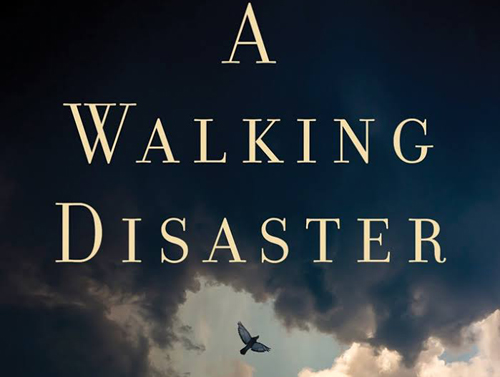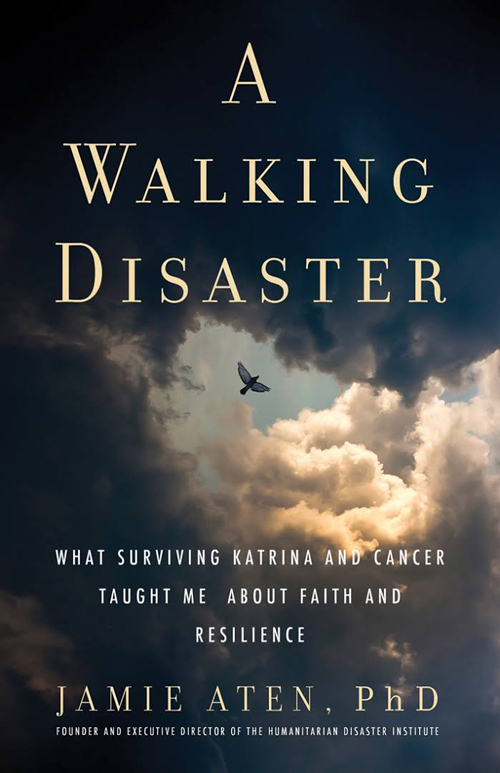
DAVID ADAMS reads disaster psychologist Jamie Aten’s book about the journey his life took when things went wrong in his own life…
Jamie Aten
A Walking Disaster: What Surviving Katrina and Cancer Taught Me About Faith and Resilience,
Templeton Press, West Conshohocken, Pennsylvania, 2018,
ISBN-13: 978-1599475448

“A honest and at times, raw, account of one man’s journey through personal ‘disaster’, this book will be a helpmate to anyone facing similar experiences – whether as the person experiencing disaster or those who are walking alongside them.”
Dr Jamie Aten knows disasters. A US-based disaster psychology and ministry expert, his professional life involves studying how people can cultivate faith and resilence when disasters strike, whether large or small. But that’s other people’s disasters. When his own life was shaken to its very core after he was diagnosed with stage IV cancer, he was forced to confront personally how it would impact and shape his life. This book explores that journey.
Aten had faced personal disaster before – in 2005, he and his wife Kelly and their newborn daughter Colleen had only moved to southern Mississippi six days before Hurricane Katrina struck and devastated the community in which they’d lived. They were fortunate – they were able to evacuate safely and their house was left largely intact. But Aten’s experience in the wake of the disaster – specifically seeing how religion and spirituality helped or hindered people’s recovery in the aftermath – led him to spend the next five years researching the subject and eventually founding the US’ first faith based academic disaster research centre – the Humanitarian Disaster Institute at Wheaton College.
But, as he writes, “disaster didn’t stay within the confines of my research”. At the just the age of 35 – and with now three young daughters and a new job as the head of the institute – a seemingly routine visit to the doctor for what he thought was a minor health issue turned into a diagnosis of advanced cancer. As one might expect, it was to have a major impact upon his faith and life.
“Though I never would have chosen it, what I learned along the journey that threatened my life ultimately reshaped my soul,” he writes.
The story that unfolds takes us into the doctor’s rooms where he is given his diagnosis, the scans and treatments that followed and how, when his largely intellectual and theological approach to his Christian faith was taken from him, he had to relearn how to encounter God in his life.
“[T]he consequence of my illness was that I discovered I only needed to be still before God,” he writes. “When I had no more strength to run or perform, I was finally still enough to experience God’s nearness with me. On my sickbed, under that prayer shawl [given to him by a colleague], I was able to lean into God.”
The book explores Aten’s response to his illness in depth – what the language he used when speaking about his condition revealed about about how he approached the issue, how he responded to those who wanted to help him and the big questions he asked God about why (and the “answers” he received) as well as an exploration of issues like facing our own mortality and “survivor guilt”.
One of the most moving parts of the book explores his response to the fact that his surgery meant he would have to live with a colostomy bag. Aten had, he writes, desperately wanted to believe that if he could make it through all the treatments and surgery, he could eventually return to the same life he had known before his diagnosis. With the bag a sign that his life would never be the same again, he recounts how he came to terms with it and was able to eventually find a “new normal” in his life.
As someone who has experienced a number of health challenges in the past year (although nothing of the seriousness of what Aten has faced), I found this an insightful book, especially with regard to coping in the aftermath when your life appears on the outside to be the same as it ever was. Dealing with the fears that can arise – am I going back to that place of illness? – and the importance of placing trust in God, surrendering our illnesses to Him, no matter how things may be looking.
A honest and at times, raw, account of one man’s journey through personal “disaster”, this book will be a helpmate to anyone facing similar experiences – whether as the person experiencing disaster or those who are walking alongside them.





